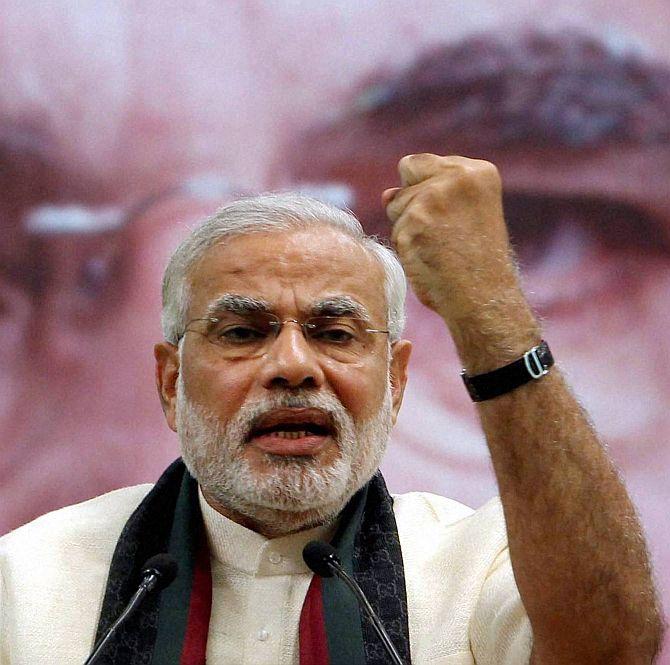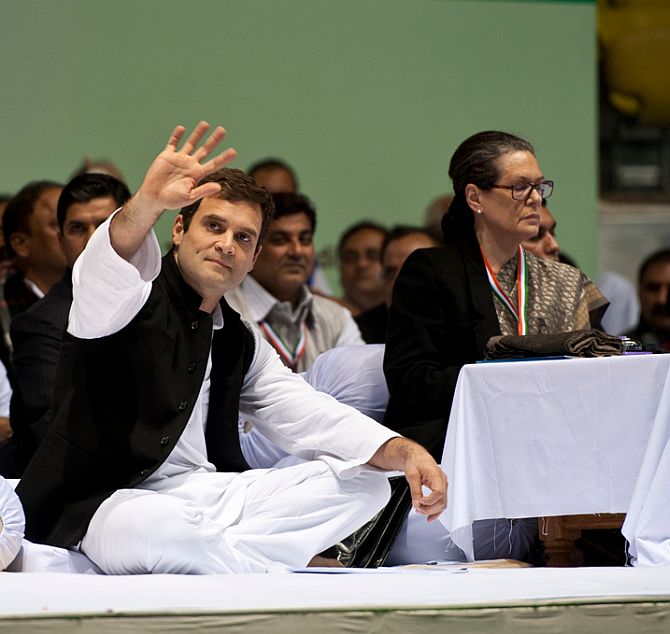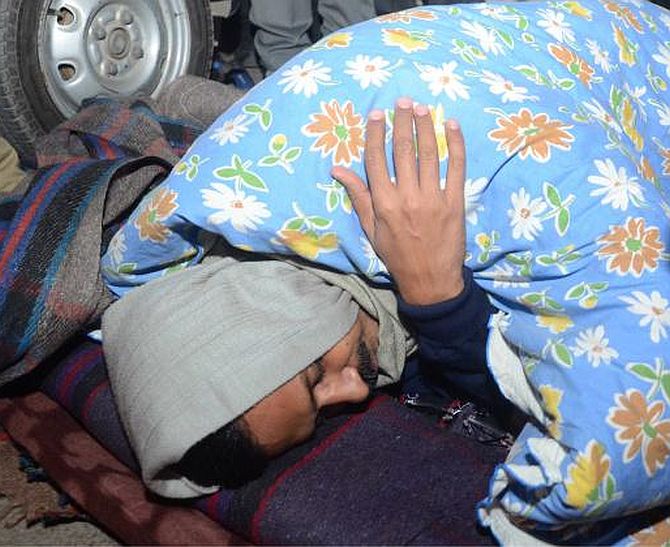
'Modi is extremely lucky that in different regions and in different communities, he enjoys different images. His public image evokes all the emotions between hope to fear, but the message that if he comes to power he will do some development is percolating down faster than his other images.'
Three months from the Lok Sabha election, Rediff.com's Sheela Bhatt checks out the emerging political trends.
ONE: The absorbing survey conducted by Lokniti-CSDS for the CNN-IBN television channel clearly suggests that the undercurrent in favour of the Bharatiya Janata Party and Narendra Modi turning into a wave in the Hindi heartland.
If elections are held today, the BJP may break its previous record of 183 seats.
While discussing the central message of the expansive survey, which polled 18,000 people across India, Rajdeep Sardesai, CNNi-IBN editor-in-chief, told Rediff.com, "There is a strong anti-UPA (United Progressive Alliance) breeze blowing across the country and the BJP is the big beneficiary across north and west India: A kind of a north-west monsoon for the BJP."
"Second," Sardesai pointed out, "Modi is clearly ahead in the leadership stakes and is pulling up his party, especially among the youth. Three, the BJP's performance could better its peak of the (Atal Bihari) Vajpayee years."
"Fourth," he added, "the Congress could be heading for its worst-ever performance and needs new allies. Lastly, regional leaders like Mamata Banerjee, J Jayalalithaa and Naveen Patnaik are going to be strong in their respective home states and still could hold key to government formation."
TWO: The unsaid message of the poll and the reports in the regional media suggests in vast regions with multiple identities across the country, Modi is fast becoming a recognisable brand.
Modi is extremely lucky that in different regions and in different communities, he enjoys different images.
His public image evokes all the emotions between hope to fear, but the message that 'if he comes to power he will do some development' is percolating down faster than his other images.
Kindly ...

THREE: One can say Congress Vice-President Rahul Gandhi's heart is in the right place, but he neither looks capable of running the country nor does he have a grip over the political situation that is driving his party downhill.
His recent interactions with women in Bhopal revealed he is neither charismatic nor decisive.
How can the Congress old guard make a neta out of him?
FOUR: Thursday's big story is the story of the changing political weather in Uttar Pradesh.
Amethi, the bastion of the Nehru-Gandhi family since the early 1920s, is showing signs of displeasure with the Gandhis.
The Aam Aadmi Party's Kumar Vishwas, who plans to contest the Lok Sabha election from Amethi, is drawing large crowds, entertaining people with his cheap jokes and couplets.
Rahul wants Sanjay Singh, the raja of Amethi, to get the Congress's Rajya Sabha ticket.
Singh, who has the ability to ruin the Congress's chances in the area, it is said, wants to join the BJP.
Even if Rahul wins the Lok Sabha election from Amethi with a reduced margin, it will smack of defeat, hence the Congress is on high alert.
FIVE: Mody's rally in Gorakhpur on Thursday is a kind of turning point.
It was the Gujarati neta's pleading to voters of Hindi-speaking Uttar Pradesh to open their doors and accept him for Gujarat-type of development of the state.
He and his partymen played upon all kinds of identities. Modi's image of being a chaiwallah (humble background); birth in a family belonging to the Other Backward Classes (the caste card); temple-like design of the stage at the rally (Hindutva); the development card (mentioning Gujarat's development again and again, particularly harping on 24/7 uninterrupted power supply); and being a decision maker (the leader with the 56-inch chest needed for development in UP) to woo voters.
Kindly ...

SIX: Arvind Kejriwal, the leader of the Aam Aadmi Party, is not a common man. Don't ever make that mistake.
Notwithstanding his bush shirt, loose pants, charming smile and powerful gaze, he is a politician. He is intelligent and clever, as you expect of any IITian.
He launches images like no other politician. The photograph of him sleeping on the pavement under a blanket in New Delhi's spine-chilling cold was a master stroke. Some Delhiwallahs got goose bumps when they saw the photograph.
Kejriwal has the talent to recognise opportunities coming his way. He is the khas aadmi of Indian politics.
Whether the Aam Aadmi Party wins or loses, by the sheer strength of his character, Kejriwal will survive the upheaval of the 2014 election and remain in political life.
SEVEN: In a parliamentary democracy that works on a fair and free election, the most important political process is the selection of candidates.
Unfortunately, in India, in all political parties, that process is the most corrupt.
Top bosses of all parties often end up giving tickets to the wrong leaders or not giving ticket to the right candidates.
The selection of candidates is extraordinarily complex at election time with caste, demography, past trends, the candidate's experience, local rivals within and outside the party, money, the candidate's muscle and management power, his public image, local issues, right candidate for the right constituency is taken in consideration.
The entire exercise is subjective and risky. The fortunes of the Congress, the BJP and ten other important regional parties will be seriously affected if the ticket distribution is not done professionally.
In the name of 'winnability', many deserving candidates are not selected and instead bullies and tainted political leaders are given tickets.
So let us wait for the final assessment of political trends after ticket distribution.
Those days are gone when voters used to blindly follow the party symbol. The AAP's success in the New Delhi assembly election has shown just that.
EIGHT: When polling takes place in the general election, it is said 543 different elections are taking place.
Each can spring surprises. Each constituency has its own mood.
The voter';s preference for a particular party and their strong likes and dislikes vary so much that it is difficult to generalise and come to an accurate assessment.
This explains why voters in the CNN-IBN survey in New Delhi preferred Arvind Kejriwal over Narendra Modi to be their prime minister.